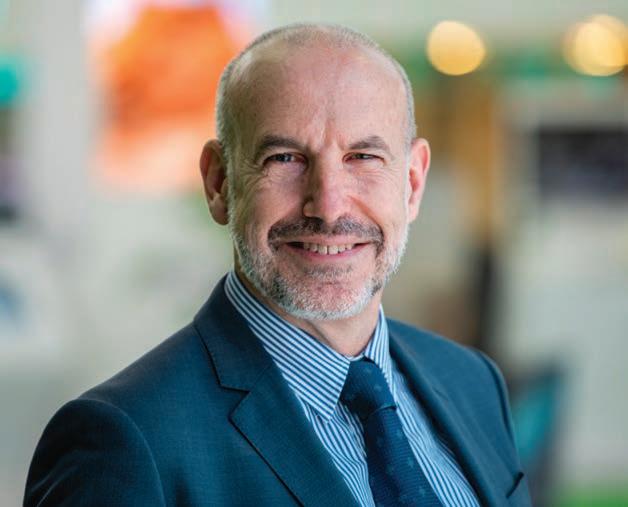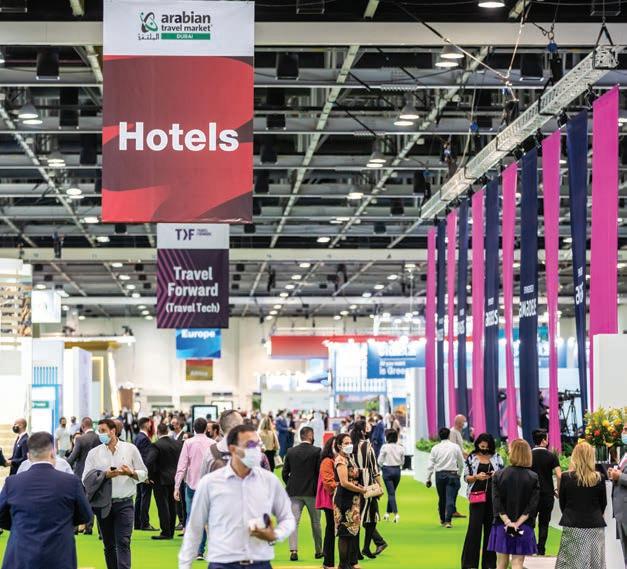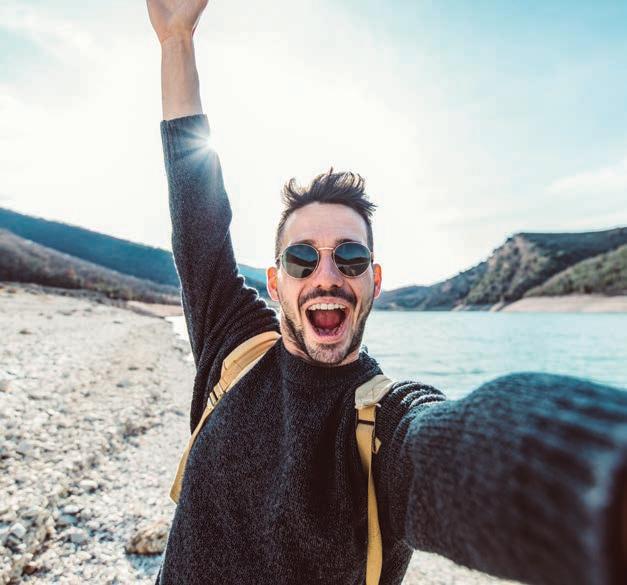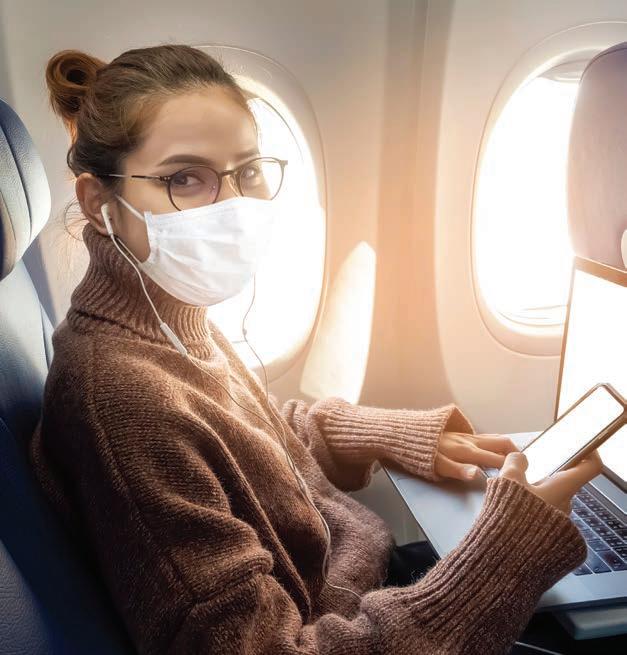
7 minute read
Leading by example
WTM & IBTM Portfolio Director Claude Blanc offers insight into the rapidly changing tourism scene in the wake of the pandemic and highlights the role that events like ATM play in the sector’s recovery
Over the last year, the travel and tourism industry has undergone a huge transformation. As international borders closed, in-destination restrictions tightened and travel became less accessible, the world sought unique methods to adapt to this new way of life.
Advertisement
In the wake of the pandemic, not much has remained unchanged but the coronavirus crisis brought with it the opportunity to restructure, reinvent and rebuild.
While these sweeping changes affected global industries, the impact on the travel and tourism trade, which relies on people embarking on journeys across the globe, was particularly hard.
“2020 and 2021 have been the most challenging years for the travel industry in many decades,” said Claude Blanc, Portfolio Director, WTM & IBTM Portfolios, who, having spent over 25 years in the industry, believes that the sector has gone through a huge learning curve over the last 12 months.
“The impact of the COVID-19 pandemic on global tourism has carried on into 2021. It has impacted countries at different times, in different ways and to varying degrees.
“Destinations have shuttered borders while holidays and business trips have been cancelled, significantly reducing flight numbers and wreaking havoc on tourism and travel-focused businesses of every conceivable kind.
“But as restrictions start to ease across countries, we need to take urgent and robust action to ensure a brighter 2021 for the global travel trade, on which millions of livelihoods and businesses depend. And that’s where Arabian Travel Market comes in.”
Since September 2020, Reed Exhibitions has been sharing its experience of running COVID-safe, faceto-face and hybrid events. And with ATM 2021, the exhibition has become the first and largest in-person travel and tourism event in the world since the onset of the pandemic last year.
“Now more than ever, the travel community needs ATM to help the industry recover. And we are excited to be the first show of the WTM Portfolio to provide a hybrid format.
“The core in-person element of our business has, in many cases, had to be replaced by a digital component, which has been crucial in allowing

1
1 Claude Blanc 2 ATM 2021 at Dubai World Trade Centre
us to continue connecting with our customers and the wider industry.
“While in-person events are one of the most effective ways to do business, it is clear that there is a long-term place for high-quality virtual events that will allow professionals from across the globe to connect more frequently – in case they can’t attend in person. Incorporating online methods as part of the mix will allow our community to engage with new markets like never before by offering more flexibility and extra layers of engagement.”
Therefore, ATM Virtual will run from May 24 to 26, 2021. The inclusion of this virtual element was essential because many travel professionals aren’t able to attend the in-person event taking place this week, with travel restrictions still in place. The 28th edition of the show was designed to reconnect travel and tourism professionals from around the world, whether they are attending in-person or online, and enable recovery for the industry.
“Our goals have slightly changed after the pandemic. Before 2020, the WTM Portfolio was dealing with a solid and consolidated industry. And since 2020, industry recovery has become our main focus and we have been providing all tools for that to happen.”
ATM 2021, therefore, offers a wide range of opportunities for the industry to reconnect and recover through one-to-one meetings, speed networking, roundtables, in-person and virtual sessions covering future trends and much more.
“We know a lot more than we did 12 months ago and now we need to take this knowledge and put it into practice as we safely reintroduce in-person events in the Middle East with ATM 2021 leading the way.”
Tomorrow’s world
Explore the next generation of industry innovations at Arabian Travel Market
In the pre-pandemic world, the concept of sustainability in travel was set to become one of the defining issues for the sector for future generations. While the coronavirus crisis has inevitably diverted attention, today’s challenges will also likely highlight the urgency of travelling responsibly as consumers, governments and industry regulators become increasingly aware of the problem.
This makes the role of travel technology more relevant than ever, as it comes at a time when businesses are seeking to transform their operations in order to effectively respond to the impact of the COVID-19 pandemic and enable a quick, sustainable recovery for the sector.

NAVIGATING THE PANDEMIC WITH TECHNOLOGY
Over the past two decades, the global travel and tourism industry has grown annually at a rate of five percent, totalling US$4.7 trillion in 2019. At the heart of this growth has been the role of Destination Marketing Organisations (DMOs).
However, when the pandemic began, the impact on the travel industry was immediate. For destination marketers in charge of developing tourism strategies based on annual planning and predicted travel behaviour, this period has been particularly difficult.
As the industry prepares for the eventual resumption of travel, more changes can be expected. Therefore, timely access to travel data has become increasingly significant for travel and hospitality firms at such a time, as it will enable providers to offer customised deals and curate unique experiences based on travellers’ personal preferences.
This also makes it important for businesses to have access to the latest technologies to gauge consumer preferences and accordingly implement best practices and tailor their approach.
Addressing the challenges that the industry is facing and the role technology can play in mitigating these effects, Travel Forward introduces the latest developments in the sector, from business management software to social media. Other innovative technologies that have helped and will continue to shape the customer journey in the post-pandemic world are also highlighted during each of the sessions taking place at the Travel Forward Theatre during this year’s event.
SPOTLIGHT ON SOCIAL
With businesses now gearing more of their efforts towards rebuilding consumer trust, one important element that can effectively contribute to the recovery of the sector is social media.
2 1
1 Social media influencer 2 Connected on the go
The role of travel technology is now more relevant than ever as businesses are transforming their operations
Businesses can learn a lot from current examples and take the necessary steps to promote their travel brand with the effective use of social media.
Shane Dallas, Founder of The Travel Camel, said: “First-hand travel reports shared on social media are important when people are deciding where to travel. If they personally know someone who has travelled to a place without any issues related to COVID-19, this can influence them to undertake the same journey.
“The same applies to people who they may not know personally, but whom they respect and admire, that travel to places without any coronavirus-related issues. Sharing personal stories on social media of people who have safely and comfortably travelled to a destination is very important in gaining consumer trust.”
In spite of recent changes in the tourism industry resulting from COVID19, Dallas argues that the role of social media in the travel sphere has not changed. In fact, he believes that “social media can inform and inspire the public about both familiar or new destinations.”
“It also remains a place where people can identify different travel styles that suit their wants and needs and they can adapt these styles to the way they travel, if they wish. This can include ideas and practices that make them feel confident and comfortable when they travel as we recover from the COVID-19 pandemic.
“COVID-19 has made us very wary of our surroundings. Even bumping into other people while walking in a mall or on the street will now elicit a different reaction when compared to before the pandemic.
“Until that mindset changes, social media should reflect this different reaction by showing spaciousness and also distance from other people when they travel. This is best achieved through photos and videos as visual media is a vital component of social media. This is not the time to promote the popularity or appeal of a destination by showing photos or videos of crowds.”







